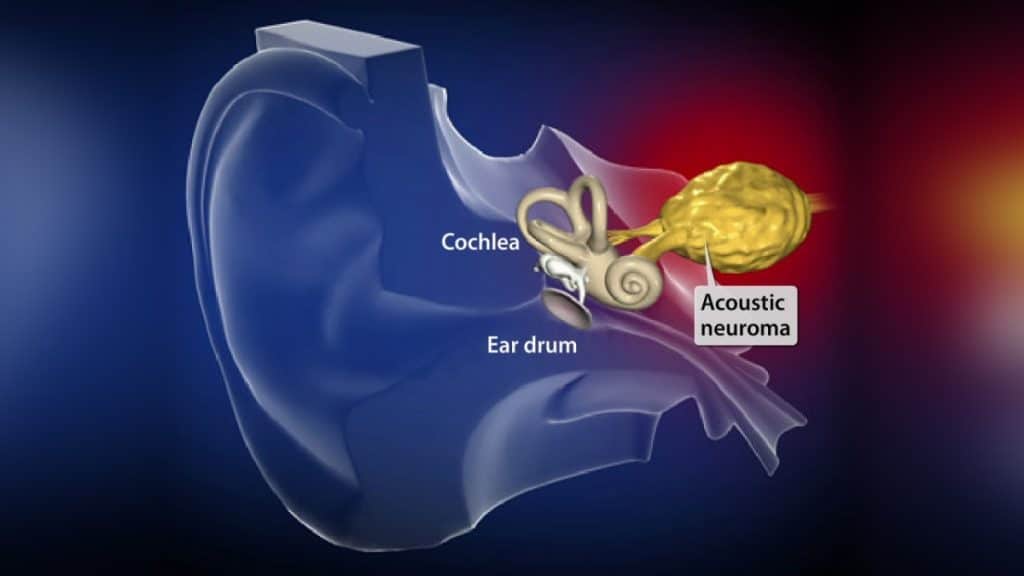Vestibular schwannoma, another name for acoustic neuroma, is a noncancerous tumor that grows on the vestibular nerve, which links the brain and inner ear. Although typically slow-growing and benign, acoustic neuromas can cause symptoms that affect hearing, balance, and overall quality of life. In this article, we’ll explore the characteristics of acoustic neuromas, the symptoms they produce, their underlying causes, and the available treatment options for managing this condition.
What is Acoustic Neuroma?
An acoustic neuroma is a tumor originating from the Schwann cells on the vestibular nerve, pivotal for conveying balance and hearing sensory data from the inner ear to the brain. Typically, these tumors develop on the vestibular section of the eighth cranial nerve, close to the inner ear’s cochlea and vestibular apparatus. Although the majority of acoustic neuromas are benign and expand slowly, without treatment, they can lead to significant symptoms and complications.
Symptoms of Acoustic Neuroma
A particular kind of tumor known as an acoustic neuroma develops from the Schwann cells of the vestibular nerve, which is in charge of sending sensory data from the inner ear to the brain about balance and hearing. Common signs and symptoms may include:
- Hearing Loss: Gradual hearing loss, usually affecting one ear initially, is one of the most common symptoms of acoustic neuroma. There may be a sensation of fullness or pressure in the afflicted ear along with this hearing loss.
- Tinnitus: Tinnitus, a chronic ringing, buzzing, or humming sound in the tumor-affected ear, is a common symptom of acoustic neuromas.
- Balance Problems: Acoustic neuromas can disrupt the vestibular nerve’s function, leading to balance problems, dizziness, and a sensation of unsteadiness or vertigo.
- Facial Weakness or Numbness: In some cases, acoustic neuromas can compress the facial nerve (cranial nerve VII), causing weakness, numbness, or paralysis on one side of the face.
- Headaches: Persistent headaches, particularly if they occur on the side of the head where the tumor is located, may be a symptom of acoustic neuroma.
Causes of Acoustic Neuroma
It’s unclear exactly what causes acoustic neuromas. On the other hand, tumor formation may be influenced by genetic abnormalities that impact the vestibular nerve’s Schwann cells. Additionally, individuals with certain genetic conditions, such as neurofibromatosis type 2 (NF2), have an increased risk of developing acoustic neuromas.
Diagnosis and Treatment
A combination of physical examination, medical history review, and diagnostic testing, such as the following, are often used to diagnose acoustic neuromas:
- Audiometry: Hearing tests can assess the extent of hearing loss and identify any abnormalities in auditory function.
- MRI Scan: Magnetic resonance imaging (MRI) is the most effective imaging technique for detecting and visualizing acoustic neuromas.
The size, location, and development rate of the tumor, in addition to the patient’s preferences and general health, all influence the available treatment choices for acoustic neuromas. Common treatment modalities include:
- Observation: For small, asymptomatic tumors, a watch-and-wait approach may be recommended, with periodic monitoring through imaging studies to track tumor growth.
- Surgery: Surgical excision may be necessary for larger or more symptomatic tumors. While entirely eliminating the tumor, the aim of surgery is to maintain brain function.
- Radiation Therapy: Using the least amount of tissue damage feasible, stereotactic radiosurgery, such as gamma knife radiosurgery, can be used to target and decrease acoustic neuromas using high-dose radiation.
Conclusion
Tinnitus, balance issues, facial weakness, hearing loss, and other symptoms are frequently brought on by a benign tumor called an acoustic neuroma that grows on the vestibular nerve. Despite being benign and often developing slowly, these tumors can have a major negative effect on a person’s quality of life if they are not treated. To successfully manage acoustic neuroma and reduce possible consequences, early diagnosis and timely treatment are crucial. It’s critical to get assessment and treatment from a skilled healthcare practitioner as soon as you notice symptoms that might indicate an acoustic neuroma.
